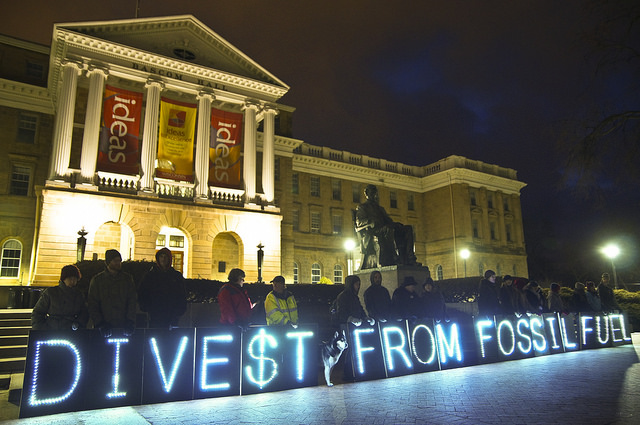Sustainable finance: the divestment approach

Flickr/Joe Brusky. Some rights reserved.
How has divestment emerged as the leading response to the financial dimension of climate change, and why is there a need for a more critical and varied response?
Climate change campaigners continue to have a monumental task ahead of them. The threats posed by climate change are wide ranging and diverse, and the behaviours that continue to drive it are complex and thorny. In the face of such a problem, campaigners have to become polymaths, thinking simultaneously about education and policy change, about financial reform and about how we can change our daily habits. Yet when it comes to thinking about the financial dimensions of climate change, one approach has largely dominated amongst activists – that of divestment.
Fossil fuel divestment makes a simple demand – that shareholders sell all their shares in any fossil-fuel related industry. Led by charismatic environmentalists like Bill McKibben and Naomi Klein, a global campaign for divestment has rocketed to prominence since it first emerged in American university campuses in 2011. Indeed, it remains particularly popular within universities, although other major financial players, from the Gates Foundation to large pension funds, have been met with demands to divest. Prominent global players, including the Guardian Media Group and the Rockefeller Fund, have committed to divestment. Fossil Free, a project of 350.org, lists on their website a total of 701 institutions committed to divesting, representing over 5.2 trillion in assets (though, with some sleight of hand, this number represents their total holdings, not the fossil-fuel based shares they’ve pledged to divest).
There are a few reasons for the popularity of divestment as a tactic. For one, it’s eminently achievable – fossil fuels only represent a small proportion of any portfolio, and many investors are already moving away from the highest-carbon investments, simply because these have ceased to make financial sense. Divestment is also a clear, simple ask, with a compelling narrative. It’s got good guys, bad guys, and a clear way to fight back, all of which makes for good headlines and an easy, intuitive appeal. It also appeals to our sense of moral righteousness. If there are people doing bad things – recklessly trashing the climate in the name of profit – we ought to condemn and distance ourselves from them in no uncertain terms. Finally, given the range of actions one can champion with regards to climate, divestment is relatively easy. It’s a lot simpler to campaign for your institution’s fund managers to shift their portfolio than it is to go vegan, stop flying, or pursue engagement strategies.
But all of this begs a bigger question: does divestment work? Here things are less clear. For one, divestment involves selling shares at a discount, in order to unload them. This almost inevitably means they’ll be snapped up by someone else, and that the new owner is unlikely to share the same scruples over investing in a fossil fuel company.
This becomes a question of balance: on the one hand, divestment can be used to delegitimize those seen as propagating the climate crisis, by generating negative press and challenging their social legitimacy to operate. On the other hand, divesting is unlikely to harm these companies’ bottom lines, and by giving up one’s position as a shareholder, one loses the ability to claim that the company ought to work for you. Simply put, divestment can generate a lot of attention in the short-term, but it may mean giving up the sort of long term influence in corporate governance granted to shareholders.
The larger problem, however, may be in defining what comes after divestment. Prominent pro-divestment groups, such as 350.org and People and Planet, have only recently begun to give considered thought as to where to sustainably re-invest freed up funds. At present only a few basic resources on re-investment exist, as against the reams of material on how to run a divestment campaign.
Looking at things in terms of carbon, this may be the wrong way around. Because divested shares are likely to be snapped up quickly, and because there is only a loose relationship between a firm’s share price and their ability to raise the capital they need to operate (most of which comes from banks) divestment is unlikely to cut emissions by driving fossil fuel firms out of business. Whether such creates sufficient stigma and pressure to lead to strong regulation is a different question. But meanwhile it’s clear that we need to move a lot of money into sustainable solutions, and fast. The IEA, for instance, estimates that we need to put $44 trillion into renewable energy technology, and an additional $23 trillion into energy efficiency to have any hope at a two-degree warming limit. This suggests that pulling money from fossil-fuel companies may do less good in fighting climate change than simply funding the competition, which is an act that doesn’t necessarily require divestment to pursue.
Divestment and sustainable re-investment aren’t necessarily opposed. But there is also a prominent tendency amongst divestment campaigns to pursue divisive campaigns. Campaigners have referred not only to fossil fuel companies, but anyone who invests in them as ‘morally bankrupt’, and students have taken universities to court over such claims. Institutions such as universities, charities and pension funds are hardly paragons of greed, and painting a picture of black and white morality may do more harm than good in alienating such potential allies who may have the potential to support other solutions. This simplistic narrative is great for the peace of mind for the campaigners, and for the worldwide unity of the divestment movement. But it can also poison the debate, ultimately resulting in a toxic stalemate, in which institutions refuse to divest, and campaigners refuse to admit ‘defeat’.
Finally, pursuit of divestment as a sole objective can lead to an unhealthy attitude towards the roots of the problem. The ‘social mandate’ for fossil fuel companies does not come only from the shares that we hold in them, but from our consumption of fossil fuels. It is unclear how far divestment should reach – how can it be wrong to invest in Shell, but permissible to invest in a car manufacturer, producing cars that run on petrol? As long as we continue to consume fossil fuels, divestment is largely a case of Pontius Pilate washing his hands. Meanwhile, other actions such as switching electricity provider may have a more direct impact on one’s carbon footprint, but lack the symbolic punch of divestment.
We shouldn’t abandon divestment – it can be appropriate in some circumstances. But the singular focus on divestment that characterises most climate finance activism at the moment is unhealthy, simplistic, and counterproductive. Climate change is a complex problem, and it’s unlikely to warrant a simple solution. With a range of complementary alternatives out there, it’s time that we opened up the debate.









